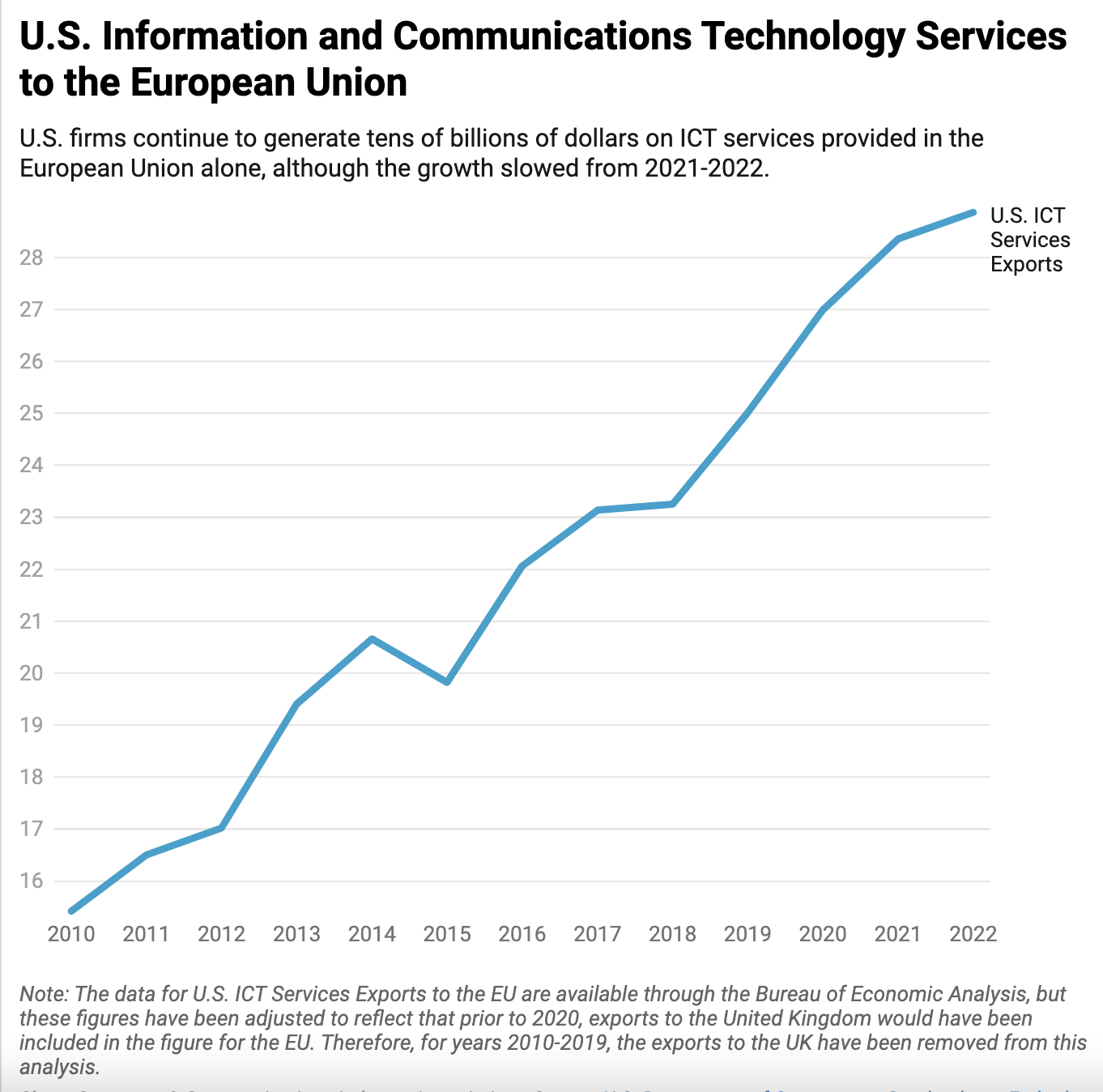Online Services Drive Exports, But Face Rising Trade Barriers
Online firms are increasingly digital, connecting users and firms to new customers around the world. This is true for a variety of services. For example, Etsy reports that over one-third of the total sales on the platform are international. According to PayPal estimates, more than $400 billion cross-border purchases have utilized the PayPal platform.
The Internet also empowers small platforms to reach new markets. Pinterest for example has built stronger user bases in Japan, France, and Germany, and is now looking to expand to Latin America. Research conducted by eBay shows that 97 percent of eBay-enabled small businesses export abroad, compared to only 1 percent of traditional businesses. This is widespread, with 61 percent of these small sellers reaching customers on four or more continents.
It is not merely e-commerce services that serve as a facilitating role in promoting trade. Data collected through the Future of Business Survey, a project between Facebook, the OECD, and the World Bank, shows how social media platforms enable exports. The Survey data was collected through businesses’ responses to their interactions on Facebook and perspectives on trade issues that affect their ability to export.
Utilizing this data, the Mercatus Center has a series of policy briefs breaking down these numbers and highlighting that firms using Facebook have a higher propensity to export (U.S. here, Australia here). The data shows that businesses, particularly small businesses, utilizing online platforms have a higher propensity to engage in international trade than traditional firms. 6.75 percent of U.S. small and medium-sized businesses (SMBs) on Facebook engage in international trade, compared to 4.33 percent of SMBs not on Facebook. In other reporting countries, the share of businesses who were engaged in trade was up to 30.9 percent (Bangladesh), with other high shares reported in businesses located in Nigeria, Egypt, Portugal, Pakistan, and the Czech Republic.
Rising Trade Barriers That Threaten Online Exports
Market access limitations were among the top export challenges identified by businesses surveyed in the Future of Business Survey above. Unfortunately, it is now all too common for governments to pursue regulatory strategies that threaten export opportunities for firms of all sizes.
The Office of the U.S. Trade Representative (USTR)’s 2019 National Trade Estimate (NTE) report, released last Friday, documents these growing market access barriers around the world. Digital trade barriers take the shape of misguided national strategies that depart from international norms, or new approaches to regulating the digital economy that fail to account for the cross-border nature of Internet exports. In recent years, the U.S. has noted the rise in digital trade barriers that affect Internet exports and services that rely on digital communications.
Below are just a few of the barriers and markets that USTR highlighted in the 2019 report:
The European Union. Through the Digital Single Market initiative, the EU has finalized a number of proposals seeking to update legal frameworks for the digital age and increase certainty across EU member states. However, as USTR observes in the report, strategy “implemented through flawed regulation, could seriously undermine transatlantic trade and investment, stifle innovation, and undermine the Commission’s own efforts to promote a more robust, EU-wide digital economy.” Regulations cited in the report include new digital services taxes proposed by the EU, France, Italy, and the UK, the EU platform-to-business regulation, policies to regulate online terrorist content including proposals by the EU, France and Germany, and the spread of press publisher’s rights in the quotation of news content.
China. Long hostile to foreign Internet firms, Chinese policy continues to restrict access to cloud service providers, Internet platforms, and communication providers. The report cites data localization and cross-border data transfer restrictions pursuant to the 2016 Cybersecurity Act and restrictions on foreign cloud service providers. USTR also commented on China’s continued censorship and filtering of online content, noting that “China currently blocks 10 of the top 30 global sites and over 10,000 domains in total, affecting billions of dollars in potential U.S. business.”
India. Like the EU, Indian regulators are currently pursuing a number of policies designed to facilitate the local Indian digital economy. However, a number of the proposals that the government claims will enable innovation will instead present significant access barriers, discourage exports that many small firms in India rely on for low-cost services, and create regulatory uncertainty. Legislation cited in the 2019 report includes proposed changes to India’s Intermediary Guidelines that govern platform responsibility, data and infrastructure localization mandates, restricts on cloud computing services, and India’s Draft National E-Commerce Strategy.
Indonesia. USTR cited a recent change to Indonesia’s import duty laws that threatens the WTO moratorium on customs duties on electronic transmissions. The moratorium reflects the international consensus that imposing duties on all electronic transmissions would be impractical to implement and ultimately undermine digital trade. The government is also exploring steps to place further regulation on online intermediaries for third party content and continue to consider regulations on ‘over-the-top’ (OTT) services.
Faced with these market access restrictions, online services are deterred from expanding and entering new markets. As almost 70 percent of firms surveyed in the Future of Business Survey that indicated selling to foreign markets was a challenge reported not exporting at all, clearly there is room for improvement to ensure that the global marketplace remains open for any firm who wants to expand into new markets.
USTR has rightfully observed that “[w]hen governments impose unnecessary barriers to cross-border data flows or discriminate against foreign digital services, local firms are often hurt the most, as they cannot take advantage of cross-border digital services that facilitate global competitiveness.” Policymakers should work to reduce these barriers and create opportunities for firms of all sizes to participate in the global digital economy.








